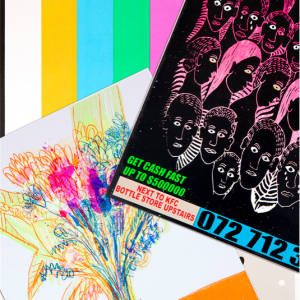SMAC Gallery
21.09 - 18.09.2020
There is a feeling children experience when learning to sleep on their own as they’re weaned off of their parent’s immediate affections, growing up. An omen foreshadowing a fear of abandonment by way of a feeling that sits in the night, waiting to give shape to the shadows that fill the empty spaces of a quiet bedroom. This feeling – the roots of what can become nyctophobia in adulthood – grows beyond a childlike concern of ‘what if’, and meets somewhere an irrational, inarticulate urge to give life to the nighttime surrounding them. There, a world is born that targets the boundless imagination of a child’s mind, filling it with the questions they’re too afraid to phrase aloud, lest they learn a truth that forever alters their understanding.

Akudzwe Elsie Chiwa, Prey (left) and Pray (right), 2020. Hand-stitched velvet on canvas frame, 82 x 180 x 15 cm (each)
This latent stress, this constant fumbling on the precipice of the edge of one’s youth and its intimate attachment to where you do your dreaming, is the foundation upon which Akudzwe Elsie Chiwa builds the world of her latest collection of work. These sculptures of fabric bound to canvas invite the audience to consider the depths of their dreaming, and the daunting task of confronting what reaches back from the dark. Considering the history that informed Chiwa’s endeavour and how she chose these sculptures as a process of deconstructing these intimate associations, the immediacy of the tension riddling the fabric feels patterned; as though a map could emerge at any moment, and return the image of these bursting sculptures to the evenings that inspired them.

Akudzwe Elsie Chiwa, All Night A Wake, 2020. Hand-stitched velvet on canvas frame, 180 x 100 x 15 cm
A presence is folded between the layers of the beautifully textured fabric as the collection builds an homage to her memories. The palette connects texture and colour effortlessly, and Chiwa’s keen eye uses her chosen medium with a fullness and consideration that echoes the imaginings of a quiet bedroom brought to life here, as subjects whose presence are as imposing as the direct gaze of a loved one. This ‘knowing’-feeling travels alongside the audience, as though they too are being watched. Chiwa gives the audience enough room between stitched-shapes to gain a sense of what they would imagine is or was, or could be there. There is a power in questioning the impressions that emerge as the eye lingers. It is also here that the nocturnal associations lift from the physical sculpture, higher, to where Akudzwe’s abstractions were born themselves; shapeless utterings that required some kind of physical embodiment to fix them to the ground, where she could continue to cherish them, for better or worse.
All Night A Wake leans into the restlessness alluded to by its title, and gives form to the motions of a mourner yearning for, and fighting against sleep. The coiling blue velvet centers the eye while more tension rolls out with the arching black fabric beneath. The notion of mourning slips its hand quickly into the grip of the aforementioned nocturnal suppositions, here. The shape of the piece impresses upon the audience the dominance of pain, how even in a space where there is already a multitude of rampant thoughts, that there is a completeness to mourning that clears away any task at hand. Then, when the night falls, the connection to it returns as well, bringing with it a series of neuroses manifesting now, in tandem with the mourning. As elusive as dark matter, these conjectures reflect our fears back to us with lives of their own, and we are left in the sacred space of sleep to make sense of it all.

Akudzwe Elsie Chiwa, Mainini is Now Basking in the Moonlight, 2020. Hand-stitched embellished fabric on canvas frame, 180 x 79 x 16 cm
Mainini is Now Basking in the Moonlight makes use of a shimmering, embellished fabric that emulates the feeling of freedom that can be connected to the nighttime and its ‘darkness’, while offering under the title a sense of liberation that follows a loved one’s passing, especially if there was any extended period of physical pain and suffering. The way the light travels over this sculpture feels reminiscent of star-gazing under a full moon. There’s a subtlety in this sculpture that reiterates the feeling that Chiwa is making room for conversation that is yet to be pronounced. There’s a humanness about that which weaves its way through the entire exhibition, as it removes the pretence of correctness, and preparedness and instead allows the lack of vocalisation to stand in what it is. It adds weight to the notion of the nocturnal, steeping the audience in a world of this imbued silence.
Akudzwe Elsie Chiwa has succeeded in conveying a sacred intimacy using various cues to create an ideation of the self and the connection it has to nighttime, where there is a projection of our humanity sent to live in and amongst the stars of our imagination. She then allows space for those projections to return, here, among the twists and turns of familiar fabric, forming bonds that layer the human experience with a wordless magic whose strength lies in its beckoning in-articulation.







